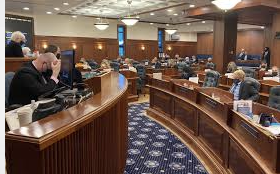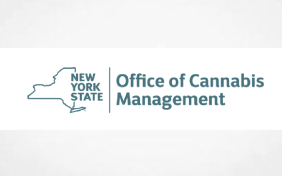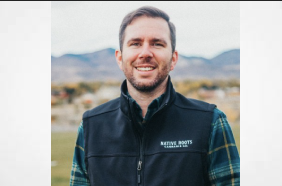In this week’s edition:
- Federal e-cigarette ban on flavored products may be in the offing
- California makes strides to curb black market, bring legal companies in line
- CDC announces breakthrough in finding possible cause of deadly vaping illness
- States prepare hemp plans for submission to the USDA
- Dentons partner Eric Berlin teaches at Northwestern, speaks at Aon conference
- And more…
Federal
The House Education & Labor Committee approved a bill to repeal the Higher Education Act Aid Elimination Penalty, a federal law that has stripped college financial aid from hundreds of thousands of students with convictions for cannabis or other drugs. The bill now proceeds to the House floor, where it is expected to pass, but faces a more uncertain future in the Senate.
Either HHS or President Trump himself is expected to make an announcement relaying details of a federal ban on flavored e-cigarettes soon, White House adviser Kellyanne Conway said, adding that menthol will not be included in the ban and vape shops may be exempted. Confusingly, the White House appears to be distinguishing vapes from e-cigarettes: “…HHS and FDA have jurisdiction over cigarettes and e-cigarettes under the Tobacco Control Act. They do not have jurisdiction over vaping and vape shops, for example.”
Senate Banking Committee Chairman Mike Crapo (R-ID) said that an impeachment trial could delay consideration of cannabis financial services legislation, but no moreso than anything else that requires floor time.
Neil Young, singer-songwriter, says his US dual citizenship application stalled because of cannabis use. Young says he passed a test in which he was asked many questions and answered truthfully, but was recently told by US Citizenship and Immigration Services that he must do another test due to his use of cannabis.
States
Alaska regulators are investigating “credible information” regarding the potential use of a dangerous pesticide (specifically, Eagle 20, which contains myclobutanil) by a cannabis cultivation business. The Alcohol and Marijuana Control Office has asked retailers to pull products grown by Houston cultivator Calm N Collective from shelves, and put them in quarantine pending further information. Myclobutanil can remain inside the cannabis leaf tissue up to 12 weeks, according to some estimates. Calm N Collective co-owner Ronald Bass claims that the tip is baseless and originated from a disgruntled former employee.
Arizona regulators will stop issuing physical medical cannabis patient cards as of December 1 and will instead issue documents via email, that can be presented on a mobile phone or printed out. Also, new cards will be good for two years, twice their current life span.
California regulators temporarily suspended the licenses of over 400 cannabis businesses (or roughly 5 percent of the state’s legal cannabis supply chain) until those businesses implement track-and-trace system training and credentialing. Regulators estimate it takes three hours to complete the requirements to get a suspension lifted and expect that all the suspended companies will comply.
California’s Attorney General announced that the state’s Campaign Against Marijuana Planting program eradicated 953,459 cannabis plants from 345 raided grow sites across the state over the past year.
The Kern County, California, Sheriff’s Office eradicated approximately 10 million cannabis plants from 11 fields (total value: more than approximately $1 billion) that were allegedly being “grown under the guise of legitimate hemp production.” The county banned commercial cannabis activity in 2017. The announcement states that the plants investigated were “well over the legal limit for industrial hemp production,” but the investigation is ongoing.
The Sacramento, California, City Council is considering a 120-day ban on cannabis dispensary ownership changes and a cap on the number of shops people can own. The change comes amid concerns that monopolies have formed in the city through ownership changes. Additionally, the City Council discussed a moratorium on industrial hemp cultivation and manufacturing.
Activists in California filed a proposed ballot measure last week that seeks to legalize the possession, cultivation and retail sale of psilocybin mushrooms. The latest version of the California Psilocybin Decriminalization Initiative “advances cognitive liberty and implements a comprehensive, statewide scheme authorizing and regulating the cultivation, processing and distribution of Psilocybin Mushrooms and the chemical compounds contained therein for personal, spiritual, religious, dietary, therapeutic, and medical use,” the measure says.
Florida’s House of Representatives filed a brief urging the state Supreme Court rule that a citizen petition to legalize adult use cannabis is an improper use of the petition process that “attempts to legislate through the ballot box.” The lawsuit is directed toward the group, called Sensible Florida, that has collected more than 83,000 signatures to put a constitutional legalization amendment on a state ballot. The state’s Constitution restricts citizen-led constitutional amendments to things that either change the state government’s structure or impact fundamental rights, the House argued. This is one of a few ballot initiatives to legalize cannabis in Florida. The Make It Legal Florida initiative, backed by Surterra and Medmen, has gathered 57,000 signatures, not enough yet to trigger judicial review.
The Chicago, Illinois, Housing Authority sent a notice reminding residents that cannabis use is illegal under federal law and is therefore prohibited in subsidized housing despite the state’s legalization law. Such policies seem unavoidable but affect the most marginalized groups who need subsidized housing and are living with a disability or illness that is benefitted by cannabis use.
Maine finalized its regulations for adult-use cannabis and announced that regulators will begin accepting applications for cannabis testing labs starting on November 18, and then open up the process for cultivation, manufacturing and retail business licenses on December 5. Individual applicants for Maine cannabis licenses must have been residents of the state for at least each of the past four years (or hold a majority ownership interest in an entity applicant) and have clean criminal records, though cannabis-related convictions for offenses that are now legal would not be disqualifying. The state licenses are unlimited, although municipalities can establish a cap or outright ban on dispensaries.
Medical cannabis users in Massachusetts are on track to regain access to vaping products starting Tuesday, November 12, after the Cannabis Control Commission did not uphold the Baker administration’s ban, though that permission could be short-lived amid ongoing legal challenges and potential future regulations from the commission.
A federal grand jury convened by the US Attorney, District of Massachusetts, is investigating agreements and payments between the state’s municipalities and the cannabis businesses located in those areas. These agreements have been criticized because local officials often demand more money than allowed under state law.
Michigan regulators have begun accepting recreational cannabis business license applications, receiving 52 on the first day. The state expects to issue its first license by the end of November and sales to begin by the end of the first quarter 2020.
Missouri regulators filed an emergency rule saying that medical cannabis businesses can pay fees, penalties and taxes “via any payment method normally acceptable to those agencies other than cash.”
New Mexico’s medical cannabis program generated $93.6 million in revenue for the first nine months of the year, and now has 77,168 patients enrolled. Enrollees are expected to top 80,000 patients by the end of the year.
New York regulators filed a rule that would allow medical cannabis dispensaries to sell hemp-derived products such as CBD. Under the proposed rule, registered organizations will be allowed to use hemp, or extracts derived from hemp, grown and processed under the authority of the New York State Department of Agriculture and Markets in the manufacturing of medical cannabis products.
Ohio regulators are investigating two more medical cannabis businesses over potentially improper ownership changes. As states continue to focus on social equity, we expect more states to audit ownership changes to ensure the goals of their programs are being met.
An Ohio judge ruled that a law requiring that 15 percent of medical cannabis licenses be owned by “economically disadvantaged groups” is unconstitutional. Judge Eamon Costello wrote that the section of Ohio cannabis law allowing quotas needs to be more narrowly tailored.
The Oklahoma State Treasurer reported that medical cannabis sales have generated $41.3 million in revenue over the past 12 months, bringing total cannabis sales for that period to $259.1 million.
A Rhode Island court upheld the state’s ban on flavored vapes. The judge found that Gov. Gina Raimondo (D) had not exceeded her constitutional authority and that the state’s Department of Health had largely followed legal administrative procedures in implementing the ban.
South Dakota activists turned in what should be more than enough signatures to qualify separate cannabis legalization and medical cannabis initiatives for the state’s 2020 ballot. Constitutional initiatives require 33,921 valid signatures, while statutory measures need 16,961, so the reform campaigns collected significantly more than needed, bolstering the chances that they will qualify for the 2020 ballot even if a sizable portion end up getting thrown out.
In a surprise to no one, South Dakota Gov. Kristi Noem (R) says she opposes proposed cannabis legalization and medical cannabis ballot measures.
Washington State announced that it has simplified its patient renewal process for medical cannabis. Patients renewing will no longer have to submit a photo.
Hemp/CBD
Georgia’s Agriculture Department plans to submit hemp regulations to the federal government by the end of the year. The US Department of Agriculture intends to authorize state plans within 60 days of submission.
The Illinois Department of Agriculture is hosting a hemp summit next month to discuss the 2019 growing season, best practices, lessons learned and the future of the hemp industry in Illinois.
South Dakota Gov. Kristi Noem (R) said that proposed federal hemp guidelines don’t change her opposition to legalizing the crop. The USDA’s rules do not preempt a state’s ability to adopt stronger requirements or prohibit production of hemp.
Select 7-Eleven stores in Colorado will house CBD dispensing machines from Greenbox Robotics. A spokesperson from 7-Eleven Corporate said the company “does not support or promote the sale of ingestible cannabis-based products.”
A small pilot study published in the Journal of Analytical Toxicology finds that vaping CBD products might lead to a positive urine test for cannabis. The study tested people after use of CBD samples, some containing tiny amounts of THC (up to 0.39% THC). One-third of those who vaped CBD-dominant cannabis had positive urine tests for THC, according to the report.
International
India’s Delhi High Court is considering a case challenging the constitutional validity of the Narcotic Drugs and Psychotropic Substances Act, 1985 (NDPS Act) which criminalizes cannabis and industrial hemp. Petitioners argue that the government, when enacting the NDPS Act, failed to consider the potential medicinal benefits of the drug.
Italy’s minister of health announced that one of the three lots that Aurora Cannabis won has been canceled, citing as the reason noncompliance with European Union Good Manufacturing Practice standards.
Malaysia’s health minister approved the cultivation of hemp for research purposes. The health minister relied on Section 6B(2) of the Dangerous Drugs Act 1952, which gives him the authority to allow the cultivation of hemp for the production of fiber and seeds solely for non-commercial purposes.
Malta’s economy minister said his country will be one of the first to offer high-grade medical cannabis in Europe. Member of the European Parliament Miriam Dali urged the European Commission to start seriously investing in research and development in medical cannabis.
Paraguay’s minister of health announced that regulators will issue five medical cannabis business licenses. Eighteen companies have applied to be among the five. (Source in Spanish)
The United Kingdom’s House of Commons Scottish Affairs Committee issued a report endorsing drug decriminalization and the opening of safe consumption facilities for illegal substances. This is the second House of Commons committee to embrace decriminalization in as many weeks. A separate panel, the Health and Social Care Committee, said last month that drugs should not be a criminal justice matter and voiced support for decriminalization, safe consumption sites and expanded access to the anti-overdose medication naloxone.
Business
New data from the US Treasury Department’s Financial Crimes Enforcement Network shows that the number of banks working with cannabis businesses leveled off during the last quarter—to 563 banks and 160 credit unions.
The cannabis industry is “scrambling for cash” amid drops in stock prices, the Wall Street Journal reports. The amount of capital raised in the industry during the week ended October 25 plummeted to $27 million compared to $708 million for the same period a year earlier, based on data from Viridian Capital Advisors.
The Scotts Miracle-Gro Company reported 38 percent growth in quarterly sales for its cannabis-focused arm Hawthorne. The increase at Hawthorne was across nearly all product categories and growth was strong in both legacy and emerging markets.
Global medical cannabis company Columbia Care Inc. has acquired The Green Solution, Colorado’s largest vertically integrated cannabis operator, through a transaction initially valued at about $140 million. Columbia Care also reported quarterly revenue of $22.1 million, an increase of 123 percent from a year ago, along with a net loss of $19.9 million, compared to $5.3 million from last year.
Cresco Labs launched an incubator program to provide cannabis social equity applicants with training and resources. The incubator is designed to provide qualifying social equity applicants with the resources, knowledge and guidance needed to successfully apply for dispensary licenses in the Illinois cannabis program.
Production is ramping up for the Illinois adult use market, according to a PharmaCann representative. Legal sales are set to begin on January 1, 2020, although so far, only 14 dispensaries have been approved for adult use.
Rapper Drake launched a new cannabis line in partnership with Canopy Growth Corporation. The joint venture, dubbed More Life Growth Co., will be 60 percent owned by Drake and 40 percent owned by Canopy Growth Corp. Industry players have surmised that the announced partnership cleverly circumvents Canada’s rules against celebrity endorsements. “The structure of setting up the joint venture between Canopy and Drake’s new company is a very clever way around the general sponsorship prohibition because he’s not technically being paid by Canopy to promote cannabis,” said Chris Bolivar, vice-president of strategic growth at cannabis retail chain Fire & Flower.
Vireo Health International, Inc., a leading physician-led, science-focused, multi-state cannabis company, announced that it has brought on as executive chairman former Canopy Growth Corp. CEO Bruce Linton.
Multiple cannabis hotel projects are underway throughout the US, including two in Southern California’s Coachella Valley—veteran hotelier Roger Bloss’s Coachill Inn Resort (and amphitheater) in Desert Hot Springs, and The Grape House, a luxury boutique hotel in Palm Springs created by restauranteur Chris Santos with business partner Neran Dhas.
Several large wealth-management firms, including Morgan Stanley, Bank of America and Wells Fargo, are allowing financial advisers to invest in Canadian cannabis stocks on their clients’ behalf. Others continue to be more conservative.
A New York federal judge named Wolf Haldenstein Adler Freeman & Herz LLP lead counsel in a consolidated investor lawsuit against Curaleaf. The lead plaintiff claims he lost more than $55,000 because Curaleaf failed to disclose it was illegally marketing CBD products as new drugs without approval from the FDA.
A legally blind man in New York has filed a proposed class action alleging that Medterra CBD LLC’s website lacks full functionality with the screen reading software that the plaintiff uses to surf the web, depriving him and other blind people of full access to the company’s website, in violation of the Americans with Disabilities Act. Web accessibility class actions have taken off in recent years and were given a lift by a Ninth Circuit opinion in Robles v. Domino’s Pizza LLC earlier this year, when the court held that the pizza chain’s website and mobile app are “public accommodations” subject to the ADA.
Sundial Growers Inc. is facing a second class action lawsuit for allegedly failing to disclose that Zenabis Global Inc. returned 554 kilograms of its cannabis containing mold and bits of rubber gloves. The Alberta-based defendant believes these claims are without merit.
Medical/Health
The CDC says it’s made a breakthrough in finding the possible cause of deadly vaping illness. The new suspect is the old suspect: vitamin E acetate, which was detected in all 29 lung tissue samples from patients that health officials tested.
The Connecticut Department of Consumer Protection has announced a new FDA-approved medical cannabis study. Researchers at Yale School of Medicine are working with CTPharma to study the effects and uses of a cannabis pill, launching an investigational new drug (IND) clinical study. The study will use Connecticut-grown cannabis in a pill form to explore its effects on pain and stress-related conditions. According to CTPharma, the study will be the first of its type on human subjects using medical cannabis with an FDA-approved clinical protocol.
A preclinical research report published by Scientific Reports demonstrated that co-exposure to cannabinoids and alcohol increased the likelihood of birth defects involving the face and brain.
PTSD patients may benefit from cannabis use. The Journal of Psychopharmacology analyzed nationally representative health data from Statistics Canada’s 2012 Community Health Survey and found that people with PTSD who have not reported past-year cannabis use are much more likely to have suicidal thoughts and go through depressive phases.
Research from Japan published in Frontiers of Psychology found that CBD “reverses anxiety-like behavior.” Thirty-seven 18- and 19-year-old Japanese teenagers with SAD and avoidant personality disorder received, in a double-blind study, cannabis oil (n = 17) containing 300 mg CBD or placebo (n = 20) daily during 4 weeks.
Researchers developed the “first fully annotated publicly available genome for Cannabis plants.” The NCBI Cannabis sativa Annotation Release 100 is now live and publicly available. The annotated genome allows the use of classical genetics and proteomics tools for the interrogation of these plants.
The UK’s Royal College of Psychiatrists is conducting a trial on the effects of medical cannabis on a host of non-qualifying conditions, including chronic pain, epilepsy, multiple sclerosis, post-traumatic stress disorder, Tourette’s syndrome, anxiety disorder or who have had a history of substance misuse. Although medical cannabis was legalized in the UK a year ago, it remains unobtainable for many patients, according to campaigners. Up to 20,000 UK patients will participate in the study.
Scientists at Johns Hopkins University are launching a study on using psilocybin to treat anorexia nervosa. Though this is the first study that will examine psilocybin as a treatment for this emotional disorder, early research involving other psychedelics has suggested promise.
A study published in Drug and Alcohol Dependence found that cannabis use disorder diagnoses among people who consume cannabis every day are declining. “Among those with past-year daily/almost daily cannabis use, there were reductions in the prevalence of DSM-IV cannabis abuse across all age groups, with reductions observed for all individual abuse items in adolescents and young adults,” the study states.
Pediatrics, the official journal of the American Academy of Pediatrics, in a study comparing young adults’ exclusive use of cannabis vs. smoked tobacco, reported that, among young adults overall, exclusive cannabis use is increasing, whereas exclusive smoked tobacco use is decreasing. The journal also found that exclusive cannabis use is higher among college students and exclusive smoked tobacco use is higher among non-college individuals.
Dentons Speaks
On November 8 and 9, partner Eric Berlin taught a course at Northwestern Pritzker School of Law, joined by Charlie Bachtell from Cresco and Jeremy Unruh from PharmaCann. On Tuesday, November 12, Berlin spoke at insurer Aon plc’s Conference on Cannabis and Employment Law.

















